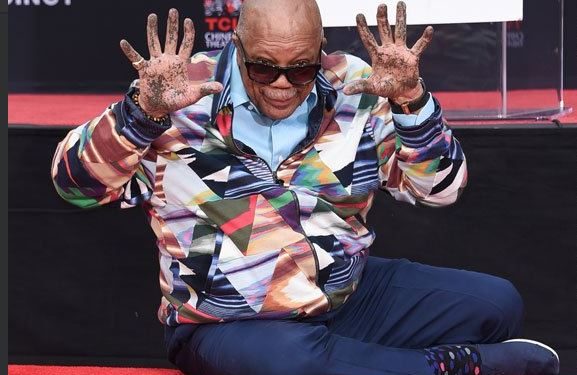There has been no shortage of Quincy Jones documentaries and tributes to the producer, musician, composer, director. Last week, Quincy Jones was honored with an imprint ceremony outside the Chinese Theatre in Hollywood, the first composer to have his hand and footprints immortalized in cement. It was quite a moment to see someone who has had such an influence on our culture in the way that Jones has to see that happen, it was more poignant to see legends of hip-hop come out to see the occasion. Daughter and filmmaker Rashida Jones was also there, delivering a touching speech for her father.
He is also the subject of her film Quincy which she worked on with co-director Alan Hicks. Quincy is perhaps the most honest and intimate look at the person behind the music. With this documentary, we travel the world, we delve into archive footage, and we see the health scares. Ultimately, it’s a thrilling look a just how much he has contributed to society, the stories he has to tell working with everyone from Ray Charles to Sinatra to Michael Jackson.
I caught up with Jones and Hicks to talk about how they sifted through almost 3000 hours to give us the gift of Quincy.
Rashida and Alan, I was at the imprint ceremony for Quincy the other day. It was such a historic moment, what did that feel like to see that happen and make such a mark there?
Rashida: It’s always great because he’s so grateful. Anytime he’s honored he’s always grateful and it’s genuine. He’s honored a lot. He should be honored a lot. I think specifically his relationship with Hollywood and the way he’s shaped so much of this town and so many things that many may not know, that’s what stood out to me.
I don’t know if people know about his relationship with Will Smith and Oprah Winfrey and all those relationships with Tv, film, and scoring. It’s not just about the giant immeasurable cultural impact of his relationship with Micahel Jackson and Frank Sinatra. The Hollywood part of it really stood out to me. Just to see Snoop, Usher, Dre, and Kareem all come out for him and pay him respect. That was so touching to me. They love him so much and he is just everybody’s father.
Alan: I’d say exactly the same thing. For me, I’m not even from this country. So, being in Hollywood is a trip. He sets the tone for those larger than life personalities and keeps epople grounded. It’s really amazing to see someone who is so graceful with the honor that he received, but also to see the respect that Dre, Usher, and Snoop all had for him in person is incredible.
Seeing that. Seeing and learning all of that about him through the documentary, you just forgot and learn at the same time how much he contributed. Where did the idea to film the documentary stem from?
Rashida: My dad has been covered before. Jane Rosenthal a producer and family friend said she wanted to make a film about my dad. She said, “I think you should direct it” and I very amateurely went about that for a couple of years. Alan and I became friends while he was shooting and promoting Keep On Keeping On which my dad is in, and I love that film so much. He just became a great source of counsel and friendship to me and I begged him to do this with me and that’s when it took momentum and we shot pretty consistently for the next three years.
I think the idea was that documentary filmmaking is, every year getting better and better and better. It’s absolutely my favorite medium and it’s because you can tell these wonderful, real stories of people and then you can make a choice of what’s the point of view of that story? What’s the look of it? What’s the structure of it? It’s this wonderful melding of filmmaking and journalism. I felt because things have gotten so good, it would be the right time to tell the story about him so that we can really show him in a personal way.
I think that’s what I loved about it, how you captured his human side. There have been so many documentaries about him, but this takes us to a whole human side. What I love about him is how honest he is. How did that help you filming him as a subject?
Alan: Quincy is so open and welcoming to people. Thankfully he was like that with myself and obviously Rashida. The idea that when you’re trying to follow a subject, the biggest thing is trust. Not only trying to gain trust, but you want to wholly gain trust. It’s not about getting them to trust you for a little while. You have to prove to them, you’re there for them and you’re not going to take advantage. Quincy trusted us. He said, “I don’t want to see the movie until it’s done, you guys have got it.” It gave us creative freedom to make the real movie.
He’d do these things where he’d call us and say, “I’m doing this trip. I’m going to Dubai, you guys would love it, you gotta come and we leave in two days.” What that does is it makes it a little harder because you never know when things are going to pop up and you have to mobilize a crew very quickly. It was this crazy thing where we were on this ride for years where we didn’t know where it was going and what was happening, but he would be so inclusive. We’d shoot a ten-hour day and at the end of the day, the crew is wasted and Quincy would say, “Come into the hotel and let’s go hang out.” We would and spend another five or six hours hanging out. That stuff would happen every day, it was such a crazy experience. I don’t think there’s anybody out there of his stature that is so caring and inclusive.
What were the figures of footage?
We had over 800 hours of verite footage and there was over 2000 hours of footage in his archives in his vault. So, 2800 hours in total.
Walk through the editing process of that and how the narrative formed because that’s a shit-ton of footage. When it ended, I wanted more, but at the same time, it’s a perfect documentary time to give us an insight. Talk about why you didn’t make it into a six-part series?
Rashida: I’m glad you wanted more.
Alan: I love shit ton.
Rashida: You gotta adopt that phrase.
But, that’s a lot of numbers.
Rashida: The good thing is that Al and I shared the same vision from the beginning. We wanted to have an equal part to tell the story in the present day and then go back to the archival footage in a very personal, emotional and visceral way.
Rashida: The good thing is that Al and I shared the same vision from the beginning. We wanted to have an equal part to tell the story in present day and then go back to the archival footage in a very personal, emotional and visceral way, so only through my dad’s point of view. Never in a clinical or academic way. We wanted to make sure there was some emotional entry point. We had that in mind. We really wanted to tell both stories chronologically so we had created these portals for ourselves which in some way was good, because then we had what we had – the almost 3000 hours of footage, and then we had to filter through this idea and it helped to have those filters.
Alan: There were creative boundaries that forced more creativity and once we locked that in, which we locked in from the beginning. Diving into the edit, everybody knew that we were shooting for this length of film and that we were not going to do any talking heads. We’re just going to use his voice from recordings of the past and seriously hunt these golden moments.
It was a reductive process. So, with Frank Sinatra, we were able to watch through all the footage, a year before the edit. We’d then mark out wherever there was a Frank Sinatra bite and put that into a marker system. Once we did that, we were able to pull all of those selects into a bigger selection of material that could be between 22 and 22 hours of stuff purely between Sinatra and Quincy. We’d just reduce it and reduce it. Then, it would come down to the three-minute scene that you’d have.
You talk about creative boundaries, and I wanted to talk about the hospital footage. It’s something no one knew about until this. When are filmmakers did you decide when to keep on rolling and when to stop when you have a moment like that?
Rashida: The truth is, when that scare happened. I was really just focused on getting through that. The reason my brother and I filmed in the hospital was really to show my dad. At the time, we were just strategizing about if, we were lucky enough for him to make it through and how we were going to get him to stop drinking forever. We wanted to film him in a place that was really low and that he wasn’t aware. He wasn’t conscious to see that so we wanted to show him what it looked like.
Al and I talked about it ad nauseam and if we wanted to include the footage. It was a very important part of the storytelling, not because it was happening while we were filming, but because it is an integral part in the story of his life. As you see in the movie, every decade he pushes himself to the brink. He calibrates to refocus and there are the next ten years with that new perspective. It wouldn’t have been the right story if we didn’t include that. I wanted to be delicate but I also wanted to make sure it was honest and we didn’t pull punches.
Rashida, what was the most pleasantly surprising footage you discovered in the archives. And for you too, Alan, what was your favorite archival discovery?
Rashida: We found footage of us in Paris. They were filming my dad. My sister and I were probably five and seven. We were walking around and looking around stores. I had never seen it. when you have a memory of your childhood that’s really based on the things that you have kept, and when you find something new it changes the history, it’s such a great way to fill in the past and that was so personal for me.
Alan: Because I’m a musician and I’m a fan, it was a consistent thing. Every day there was something. The Sinatra and Ray Charles stuff was super interesting.
One thing I didn’t know about was his relationship with Nelson Mandela and that was a complete surprise. It wasn’t on my radar. I saw a photo and thought they just met each other. As we dug stuff up, I saw videos and realized their work together spanned decades and that opened up a whole tapestry with his humanitarian side.
Then one day, I saw footage of Qunicy in 1983 doing yoga in his speedos.
















